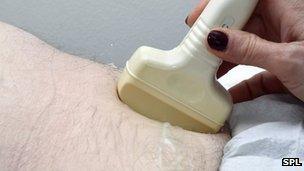Aneurysm - screenings linked to drop in death rate
- Published

An ultrasound scan can reveal if the aorta is enlarged
Far fewer patients who have surgery for abdominal aortic aneurysm (AAA) now die on the operating table - an improvement experts say is partly due to screening.
Men in most areas of England aged 65 and older are invited for a scan to check for AAA - when the body's main blood vessel is abnormally enlarged and without repair risks a fatal rupture.
Before screening began in 2009 the UK had the highest death rate in Europe.
The Department of Health said screening would be rolled out by April.
The UK's death rate for AAA repairs was 7.5% in 2009 but in England it is now 1.6%.
As some people get older, the aorta - the large blood vessel that carries blood from your heart to your body - can get weak and swell up.
It is estimated that about 1 in 25 men in England aged between 65 and 74 have an abdominal aortic aneurysm.
Most of these are small and not serious but with larger ones comes a greater risk of rupture - a medical emergency that is fatal in about 80% of cases.
Studies suggest that screening should reduce AAA-related deaths by up to half by detecting aneurysms early so they can be repaired.
For every 200 men screened by the NHS AAA Screening Programme (NAAASP), eight will have an aneurysm but only one will have one large enough to require treatment.
By April 2013, the programme should cover the whole of England - Scotland, Wales and Northern Ireland are in the process of adopting it.
Annual data from the NAAASP shows that 190 men had elective surgery in 2011-12 to repair aneurysms detected by screening and there were three deaths - a mortality rate of 1.6%.
'Justifiably proud'
Of a reported 8,380 patients in the UK who had AAA surgery between 2008 and 2010, 197 died, giving an elective hospital mortality rate of 2.4%.
Experts say the improvement is partly due to the introduction of screening - which means more patients are being treated earlier when complications are less likely.
Another reason cited is the reorganisation of services to ensure that only hospitals with the most expertise in treating AAA carry out this type of surgery.
Jonothan Earnshaw, NAAASP director, said: "Research shows hospitals that do a lot of these operations get better results, and this is also reflected in the latest mortality figures."
Prof Ross Naylor, president of the Vascular Society of Great Britain and Ireland, said: "The UK can be justifiably proud of being one of only a few countries to have implemented a national aneurysm screening programme which has met every quality target regarding deliverability and low procedural risks."
A Department of Health spokesperson said: "Screening can save lives and improve the health of the nation - by detecting abdominal aortic aneurysms early, they can be monitored or treated where necessary, saving the lives of thousands of older men.
"Full roll-out of the screening programme is expected by April 2013."
- Published12 October 2012